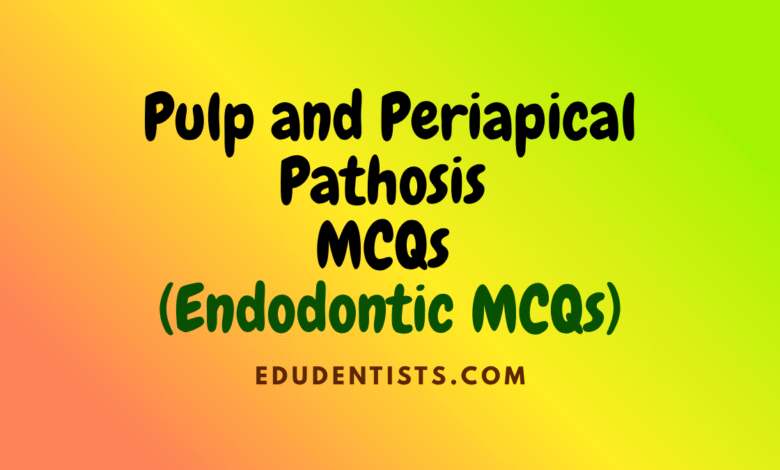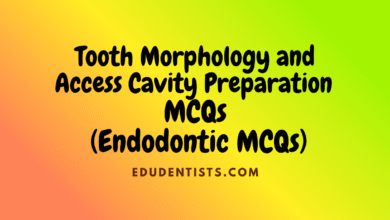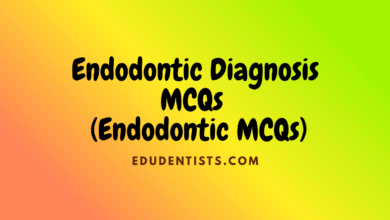Endodontics MCQs
Pulp and Periapical Pathosis MCQs (Endodontic MCQs)
Pulp and Periapical Pathosis MCQs (Endodontic MCQs)

Pulp and Periapical Pathosis MCQs
(Endodontic MCQs)
Pulp and Periapical Pathosis MCQs _ Endodontic MCQs
- A direct pulp exposure of a carious lesion is necessary to have a pulpal response and inflammation.
a. True
b. False - What factor is the most important in determining if pulp tissue becomes necrotic slowly or rapidly after carious pulp exposure and pulpal inflammation?
a. virulence of bacteria
b. host resistance
c. amount of circulation
d. lymph drainage - What is necessary for pulp and peri-radicular pathosis to develop?
a. exposure of pulp tissue
b. exposure of dentin
c. presence of bacteria
d. trauma - Which of the following statements is true regarding mechanical irritants?
a. Changes to the underlying pulp, such as odontoblast aspiration, are irreversible.
b. Potential for pulp injury decreases as more dentin is removed.
c. Operative procedures without water coolant cause more irritation than those performed under water spray.
d. There is decreased permeability and constriction of blood vessels in the early stages of pulpitis. - What nonspecific inflammatory mediators are not present when the dental pulp is irritated?
a. histamine
b. epinephrine
c. bradykinin
d. arachidonic acid metabolites - What cell type associated with immune response is not present in severely inflamed dental pulp?
a. T lymphocytes
b. B lymphocytes
c. macrophages
d. odontoclasts - What is the cause of pain during the progression of pulpal injury?
a. elevation of the sensory nerve threshold
b. decrease of arteriole vasodilatation
c. increase of venule vascular permeability
d. decrease of pulp tissue pressure pulpitis. - What is reversible pulpitis?
a. severe inflammation of pulp tissue
b. yields a negative response to electric pulp testing
c. yields a positive response to thermal pulp testing
d. requires root canal treatment. - What is irreversible pulpitis?
a. a severe inflammatory process
b. precedes reversible pulpitis
c. resolves when the causative agent is removed
d. yields a negative response to thermal pulp testing. - Which of the following is not a hard tissue change that may result from pulpal irritation or inflammation?
a. calcification of pulp tissue spaces
b. resorption of pulp tissue spaces
c. formation of pulp stones
d. thickening of periodontal ligament - What are the signs and symptoms associated with symptomatic apical periodontitis (acute apical periodontitis)?
a. normal sensation on mastication
b. normal sensation on fi nger pressure
c. marked or excruciating pain on tapping with a mirror handle
d. presence of a large periapical lesion - What histologic feature differentiates a periapical granuloma from a periapical cyst?
a. presence of mast cells
b. presence of lymphocytes
c. presence of plasma cells
d. presence of an epithelial lined cavity - Which of the following is not associated with acute apical abscess?
a. moderate to severe discomfort
b. intense and prolonged response to thermal stimulus
c. negative response to electric pulp testing
d. tenderness to percussion and palpation - What factors may impact and influence whether periradicular lesions heal completely or incompletely?
a. size of the lesion
b. blood supply
c. systemic disease
d. all of the above - What is the most important aid in distinguishing between endodontic and nonendodontic periradicular lesions?
a. radiographic location
b. radiographic appearance
c. pulp vitality testing
d. patient’s history





